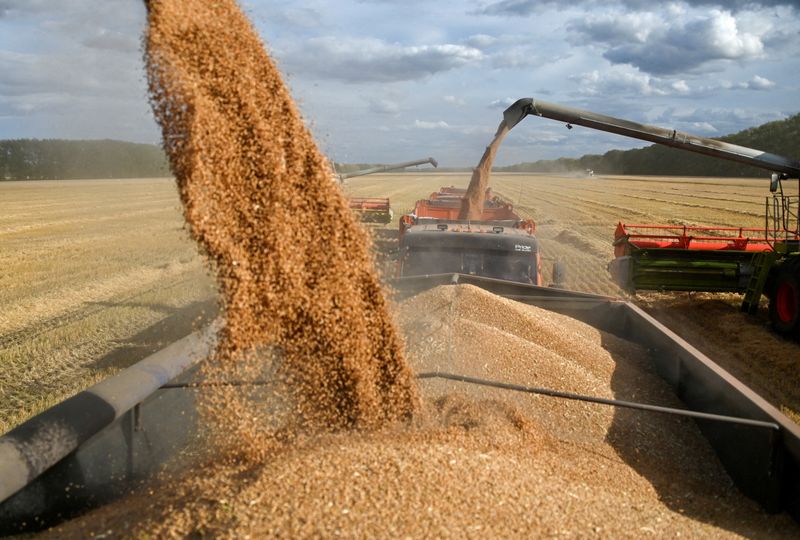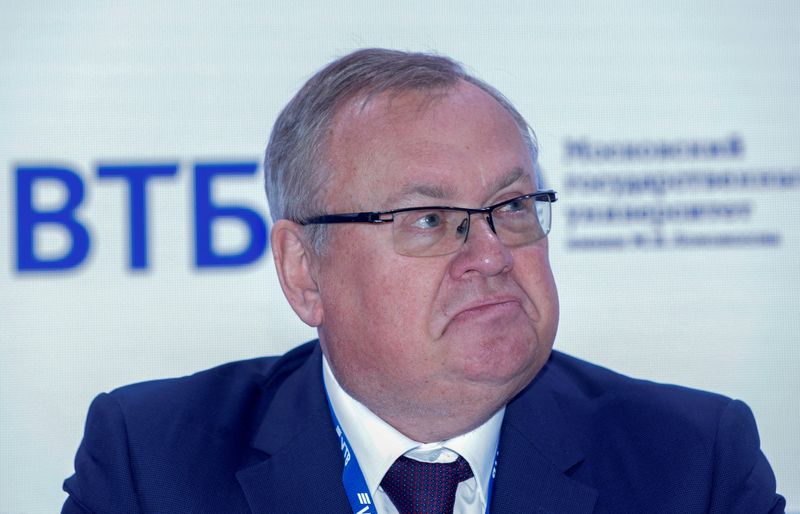By Polina Devitt, Michael Hogan and Darya Korsunskaya
MOSCOW/HAMBURG (Reuters) - Sanctions-hit VTB Bank has urged President Vladimir Putin to curb the activities of Western grain traders in Russia, citing the need to strengthen Russian traders' role in the global market, a letter seen by Reuters shows.
In the letter dated Sept. 14, VTB Chief Executive Andrei Kostin asked Putin to issue a decree to prohibit companies belonging to "persons related to unfriendly states" from buying grain and oilseeds from Russian farmers for onward export.
The order should also prohibit firms related to "unfriendly" states from owning Russian companies involved in grain loading capacity in ports, and grain storage, he said.
"Exporters from unfriendly countries own about 15% of Russian port transhipment capacity in the Azov-Black Sea basin, allowing them to extract additional profits from trade in Russian grain... while the Russian economy and budget are missing out on significant revenues," Kostin said.
VTB owns stakes in a number of major Russian grain export hubs in the Black Sea. The bank declined Reuters' request for comment on the letter.
Russia is the world's largest wheat exporter, mainly supplying the Middle East and Africa.
Russian grain market players should still be allowed to sell grain to international traders for export on a free-on-board basis, which includes delivery to the final destination, the letter said.
Dozens of foreign firms, including Starbucks (NASDAQ:SBUX) and McDonald's (NYSE:MCD), have left Russia since Moscow sent thousands of troops to Ukraine on Feb. 24.
Although food supplies were not targeted by Western sanctions, some global grains traders, such as Bunge (NYSE:BG) and Cargill Inc, began scaling back their Russian operations in March.
However others, including Viterra, which is part-owned by Switzerland-based mining and trading giant Glencore (OTC:GLNCY), continue working extensively in Russia.
Viterra and VTB share ownership of a grain terminal in the Black Sea, while Louis Dreyfus also has a terminal in the Azov Sea.
Viterra said: "We are aware of VTB's proposal, but we are not in position to comment further at this time." Louis Dreyfus declined to comment.
LEVEL OF INFLUENCE
According to the VTB letter, the measures outlined in the proposal would allow Russia to "determine the main geography of countries importing Russian grain" and give Moscow "a fundamentally different level of influence over market pricing".
Hand-written notes apparently signed by Putin on the letter suggest that he had asked his aide to review the proposal with the government.
The Kremlin does not comment on confidential correspondence, spokesman Dmitry Peskov told Reuters.
A source close to the Kremlin told Reuters that the proposal had been already sent to the government for consideration.
"But the main idea is to strengthen the position of Russian traders on the global market, not to prohibit anyone from doing anything," the source said.
Russia's agriculture ministry did not reply to a Reuters request for comment.
In May Russian agriculture minister Dmitry Patrushev, when asked by Viterra about Moscow's stance on foreign companies which still operate in Russia's grain sector, said Moscow wants them to stay and will support them.

According to one grain trader, the government is expected to prepare its response to VTB's proposal by Sept. 30.
If the proposal results in a decree, it would be unprecedented, the trader told Reuters: "It has never been done with any other (industry) in Russia."
